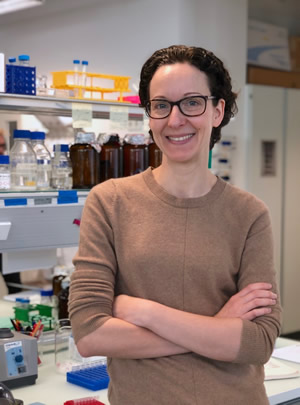By Estefanía Sánchez Vásquez
 Born and raised in Argentina, Dr. Luisa Cochella has had a long fascination with RNA, and it has carried her across continents and oceans. Now a group leader at the Research Institute of Molecular Pathology (IMP) in Vienna, Dr. Cochella works on understanding how transcriptional and post-transcriptional mechanisms control cell-type specification. Her work uses the nematode C. elegans to investigate the role of microRNAs (miRNAs) as repressors in the genetic programs that control development. Among other questions, her group studies how redundancy among different miRNA family members and the acquisition of miRNA functions during evolution have shaped the developmental process.
Born and raised in Argentina, Dr. Luisa Cochella has had a long fascination with RNA, and it has carried her across continents and oceans. Now a group leader at the Research Institute of Molecular Pathology (IMP) in Vienna, Dr. Cochella works on understanding how transcriptional and post-transcriptional mechanisms control cell-type specification. Her work uses the nematode C. elegans to investigate the role of microRNAs (miRNAs) as repressors in the genetic programs that control development. Among other questions, her group studies how redundancy among different miRNA family members and the acquisition of miRNA functions during evolution have shaped the developmental process.
After receiving a Bachelor of Science degree in Biology from Buenos Aires University, Dr. Cochella pursued graduate research with Dr. Rachel Green at Johns Hopkins University, investigating the role of the tRNA body in the fidelity of codon:anticodon pairing during translation. For her post-doctoral research, she wanted ” to work in the context of a living multicellular organism.” She explained, “I had been introduced to C. elegans by our neighbor lab during my PhD: the lab of Geraldine Seydoux, and it seemed to me that the worm, as an experimental system, was similar to the ribosome: the depth of the existing knowledge in both is such that you can ask very precise, mechanistic questions. This is something I realized I liked in my science.” Dr. Cochella carried out her postdoctoral training with Dr. Oliver Hobert (Columbia University), where she studied miRNA function during animal development and discovered that the combinatorial action of transcription factors over time controls expression of a neuron-type specific miRNA and is critical for shaping neuronal diversity.
“Love what you do and think deeply”
But her post-doc proved challenging at times, especially when she decided to change projects. “I worried that my chance to make it in academia was slipping away,” she said. “But a number of factors helped me to pull through—especially the continued support and confidence from my mentors and my colleagues. I also realized I still loved going to the lab every day, doing experiments and thinking about science. Together, these helped me to just continue until unexpected, new findings emerged.”
Dr. Cochella reflected, “I had two wonderful, but very different mentors. The one thing, though, that I saw in both of them and that I think has contributed to their success, is fearlessness.” For current trainees, she added two more pieces of advice. “First, surround yourself with colleagues you trust and respect, with whom you can discuss science and collaborate, but who will also challenge you to think deeper and do better science. And second, love what you do and think deeply. If you truly are excited about what you’re working on, you will have the internal drive to go beyond the commonplace, and it will help you get through those more challenging times.”
The 2003 RNA Society Meeting in Vienna had a profound impact on her. Dr. Cochella explained, “This meeting put Vienna on the map for me as a hub for RNA research. Little did I know that 10 years later I would start my lab in Vienna!” She added, “The community feeling of the RNA Society is unique. I had been going to the RNA meetings regularly as a PhD student, but I took a hiatus as a post-doc. When I returned to the RNA community as a PI, it felt like I was being welcomed back home.”
Even though Dr. Cochella’s mainly works on miRNAs (which she considers “super cool”) her favorite RNA (or, as she called it, her “first love”) is E. coli tRNA-Trp. You can find her on Twitter as @LCochella or visit her group’s website here.
